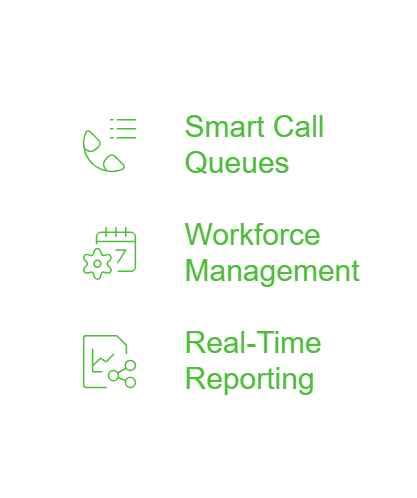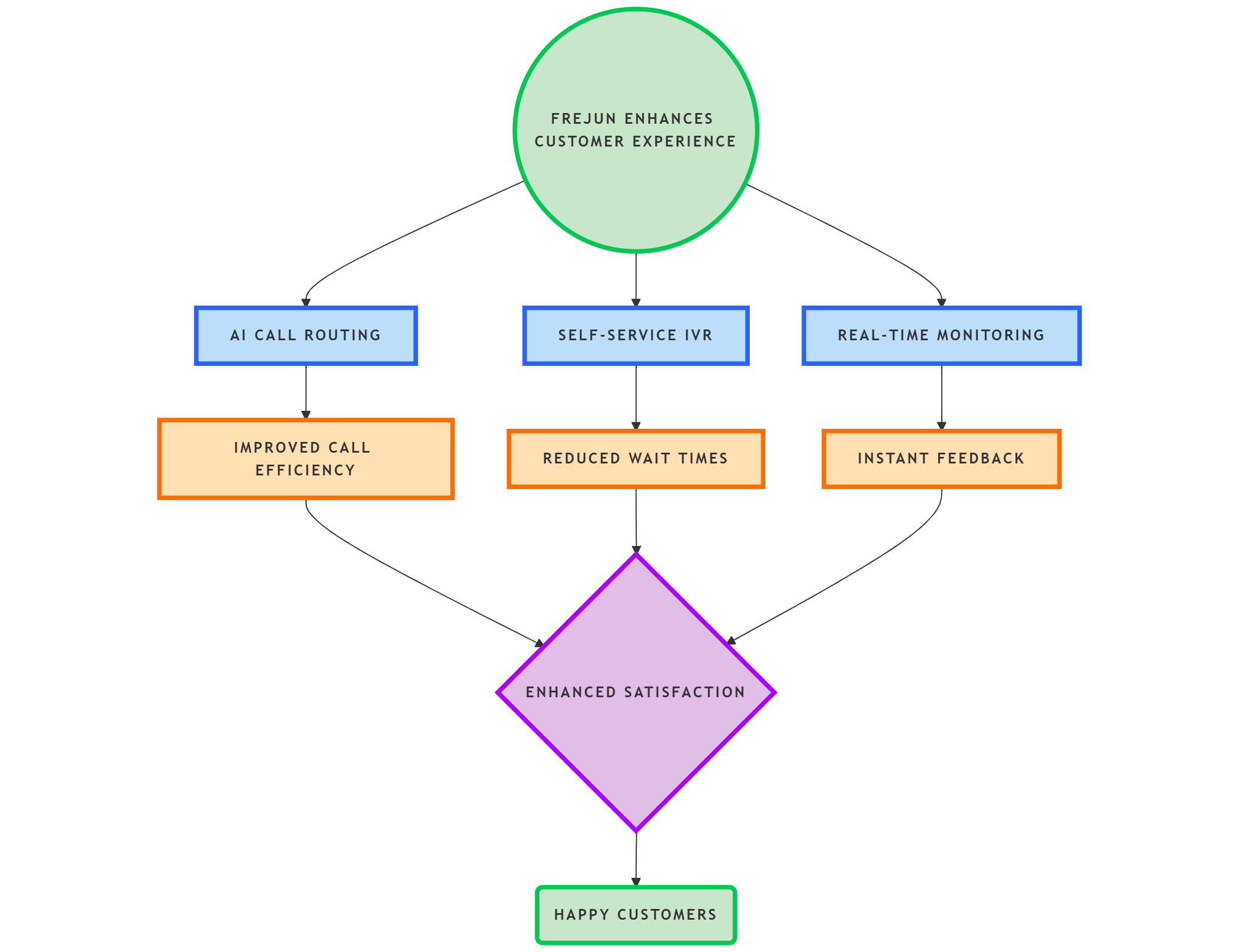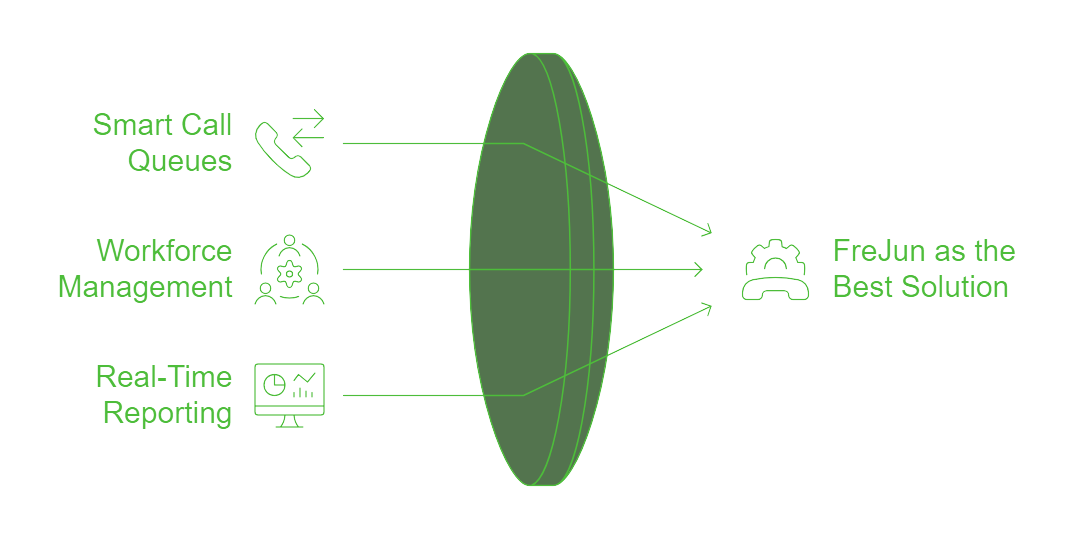Last updated on November 15th, 2025 at 11:14 am
Call centers are in a perpetual state of evolution, adapting to the ever-changing landscape of customer service and the technological advancements that drive it. In 2025 fast-paced world, a modern call center phone system is a cornerstone for any business that aims to provide exceptional customer support. Such a system must be robust enough to handle a high volume of calls while also being equipped with a suite of features that bolster efficiency and elevate the customer experience.
Table of contents
- What’s One Must-Have Feature in a Modern Call Center Phone System?
- How Does AI Enhance Modern Call Center Phone Systems?
- What are the Essential Features for your Next Call Center Phone System?
- How FreJun Enhances Customer Experience?
- 3. Call Queue Management
- 4. Skills-Based Routing
- 5. Call Recording
- 6. Real-Time Dashboards and Reporting
- 7. CRM Integration
- 8. Multichannel Communication Options
- 9. Scripting and Workflow Tools
- 10. Workforce Management Tools
- 11. Scalability and Flexibility
- 12. Security and Compliance Features
- 13. Exceptional Support and Training
- What are the Features and Importance of Call Center Phone System?
- Conclusion
- Frequently Asked Questions
What’s One Must-Have Feature in a Modern Call Center Phone System?

Intelligent call routing is essential FreJun offers smart routing based on caller data and agent availability to optimize efficiency.
How Does AI Enhance Modern Call Center Phone Systems?
AI features in call center systems provide call analytics, predictive routing, sentiment analysis, and automated responses, helping managers make data-driven decisions. AI improves efficiency by reducing wait times, prioritizing high-value calls, and coaching agents for better performance.
What are the Essential Features for your Next Call Center Phone System?
These are the 13 essential features that are imperative when selecting a call center phone system, ensuring your business remains competitive and is capable of delivering unparalleled support.
1. Interactive Voice Response (IVR)
An Interactive Voice Response (IVR) system is a critical component that allows callers to navigate through a menu using voice commands or touch-tone keypad selections. This sophisticated technology guides customers through a series of automated prompts, leading them to the appropriate department or agent swiftly and efficiently. By streamlining the initial contact process, IVR systems significantly reduce wait times and enhance the likelihood that callers are connected to the right individual who can adeptly address their concerns or inquiries. For businesses, including professional answering services for law firms, an effective IVR can help ensure that clients receive timely assistance and are directed to the right legal representatives.
2. Automatic Call Distribution (ACD)
Automatic Call Distribution (ACD) systems are the linchpin of effective call management. They utilize intelligent algorithms to route incoming calls to the most suitable agent or department based on a variety of predetermined criteria, such as agent availability, specific skill sets, or the priority level of the caller. This strategic distribution of calls is instrumental in minimizing hold times and bolstering the rates of first contact resolution, which is a key indicator of customer satisfaction and operational efficiency.
How FreJun Enhances Customer Experience?

3. Call Queue Management

Masterful call queue management is essential for maintaining equilibrium between incoming call traffic and available support agents. A sophisticated call center phone system will offer robust features that enable the creation of priority queues, provide real-time call analytics, and facilitate the seamless adjustment of agent availability. These capabilities help manage fluctuating call volumes and ensure that service level objectives are consistently met without compromising customer service quality.
4. Skills-Based Routing
Skills-based call routing is a feature that takes call distribution to a more granular level by directing calls to agents who possess the most appropriate expertise to handle specific types of inquiries or issues. This targeted approach ensures that customers receive specialized assistance from agents who are not only knowledgeable but are also best equipped to resolve their problems efficiently.
The result is a notable increase in customer satisfaction and a reduction in the need for transferring calls between different agents or departments.
5. Call Recording
The ability to record calls is invaluable for a multitude of reasons. It provides a wealth of insights into agent performance and customer interactions, which can be analyzed to pinpoint areas for improvement. Managers can leverage these recordings to develop targeted coaching or training initiatives, enhancing the overall quality of customer service. Furthermore, recorded calls serve as a crucial tool for dispute resolution and are instrumental in ensuring adherence to industry regulations and standards.
6. Real-Time Dashboards and Reporting
Real-time dashboards and reporting tools empower call center managers with the capability to monitor key performance indicators and agent activity as it happens. This immediate access to data is indispensable for making informed decisions that affect staffing, queue management, and other operational aspects. By leveraging these tools, managers can swiftly respond to changing conditions, ensuring that the call center maintains peak performance and consistently achieves its service level objectives.
7. CRM Integration
The integration of your call center phone system with a Customer Relationship Management (CRM) platform is a game-changer for streamlining workflows and fostering collaboration among agents. CRM integration provides agents with instant access to comprehensive customer histories and data, enabling them to deliver personalized and efficient service. Hence, this seamless connectivity ensures that every interaction is meticulously recorded and tracked within the CRM system, creating a cohesive and informed customer service experience.
8. Multichannel Communication Options
A state-of-the-art call center phone system must be versatile enough to support a wide array of communication channels, including voice calls, email, live chat, and social media interactions. By offering customers a diverse selection of channels through which they can reach out to your business, you cater to their preferences and convenience, significantly enhancing the overall customer experience and satisfaction.
This multichannel approach is not only expected by modern consumers but is also a key differentiator in a competitive marketplace.
9. Scripting and Workflow Tools
Scripting and workflow tools help agents deliver a consistent, efficient, and personalized customer experience. Thus, these tools automate routine tasks and provide agents with customized scripts or step-by-step guidance, which helps to streamline customer interactions. By equipping agents with these resources, you can significantly increase productivity, minimize the likelihood of errors, and ensure that communications with customers are clear and effective.
10. Workforce Management Tools
Effective workforce management is a cornerstone of a high-performing call center. Thus, a phone system that incorporates workforce management tools can assist in forecasting call volumes, generating staffing schedules, and tracking agent performance. Hence, these tools are essential for ensuring that your call center operates smoothly and meets its service level objectives, which in turn leads to a more satisfied customer base and a more engaged workforce.
11. Scalability and Flexibility
As your business expands, it is imperative that your call center phone system can scale accordingly. Hence, a scalable solution can accommodate an increasing number of agents and a growing volume of calls without compromising performance. Additionally, flexible deployment options, such as cloud-based or on-premises solutions, are important to consider as they allow you to tailor the system to your organization’s evolving needs and preferences.
12. Security and Compliance Features
In an era where data security and regulatory compliance are paramount, your call center phone system must include robust security features. Encryption, secure remote access, and stringent call recording storage policies are essential for protecting sensitive information and ensuring compliance with industry-specific regulations, such as the General Data Protection Regulation (GDPR), Health Insurance Portability and Accountability Act (HIPAA), or Payment Card Industry Data Security Standard (PCI DSS).
13. Exceptional Support and Training
The quality of support and training provided by the vendor greatly enhances the value of a call center phone system. Thus, comprehensive training resources, including webinars, user guides, and video tutorials, are crucial for enabling your team to fully utilize the system’s capabilities. Equally important is the availability of reliable and responsive customer support to address any technical issues or questions that may arise during the system’s operation.
What are the Features and Importance of Call Center Phone System?
| Feature | Importance in 2025 |
| AI-Driven Automation | Essential |
| Cloud Scalability | High |
| Omnichannel Integration | Must-Have |
| Workforce Optimization | Critical |
| Customer Experience Tools | Standard |
Conclusion
The selection of the right call center phone system is a pivotal decision. This can significantly impact the success of your call center operations. Thus, by prioritizing features such as IVR, ACD, multichannel communication options, CRM integration, and exceptional support, you position your business to deliver outstanding customer service and foster a loyal customer base. Hence, keep these 13 essential features at the forefront of your evaluation process. Thus, you will be well on your way to choosing the best solution for your organization.
By leveraging FreJun and other cutting-edge AI-driven call center phone systems, businesses can enhance customer experience, increase productivity, and optimize operations in 2025!
Further Reading: Boost Your Sales Efficiency with VoIP Software: A Comprehensive Guide
Frequently Asked Questions
It helps monitor quality, train agents, and resolve disputes. FreJun offers secure and searchable call recordings.
IVR (Interactive Voice Response) guides callers using voice menus. FreJun provides customizable IVR flows to improve caller experience.
Analytics offer insights into call volumes, durations, and agent performance. FreJun includes real-time dashboards and reporting.
It ensures callers reach the right agent faster. FreJun uses advanced algorithms for dynamic call distribution.
Yes, live monitoring lets supervisors guide and assess in real-time. FreJun supports whisper, barge-in, and listen features.
Cloud systems are more flexible, scalable, and cost-effective. FreJun is a reliable cloud-based platform.
Most modern systems do. FreJun supports remote work with mobile and browser-based calling options.
